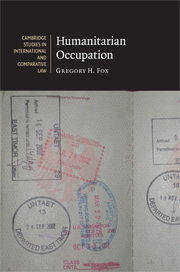Book contents
4 - Rejected models of statehood
Published online by Cambridge University Press: 02 February 2010
Summary
Why in the cases of Bosnia, Kosovo, East Timor and Eastern Slavonia has the international community taken the extraordinary step of divesting national governments of authority over their own territories? Chapters 4 and 5 seek to answer that question by situating humanitarian occupation missions in the context of legal principles addressed to the spasmodic civil wars that prompted the missions in the first place. I will suggest that those principles, when considered together, envision a highly particularized model of the state. I will do so in two parts. This chapter describes models of statehood systematically rejected by international law and therefore unlikely to shape the mandates of occupation missions. The next chapter will describe the new, affirmative model that has emerged in a variety of normative settings. The humanitarian occupation missions may be seen as operationalizing that emerging model. Humanitarian occupation is thus a small but remarkably telling part of a much larger project in international law to reimagine the state, and in particular, its core attributes of population, governance and territory.
The historical review of international governance in Chapters 1 and 2 suggests that a link between those initiatives and norms of statehood is not entirely new. The link is weakest in the earliest cases, which arose from unresolved territorial disputes after World War I and which may be explained in fairly straightforward geo-strategic terms. The mandate and trusteeship regimes share an element of that realist explanation; they were, after all, the colonies of defeated states appropriated and distributed by the victorious powers. But these arrangements also introduced a concern for the welfare of colonial peoples, culminating in demands for their independence.
- Type
- Chapter
- Information
- Humanitarian Occupation , pp. 115 - 141Publisher: Cambridge University PressPrint publication year: 2008



